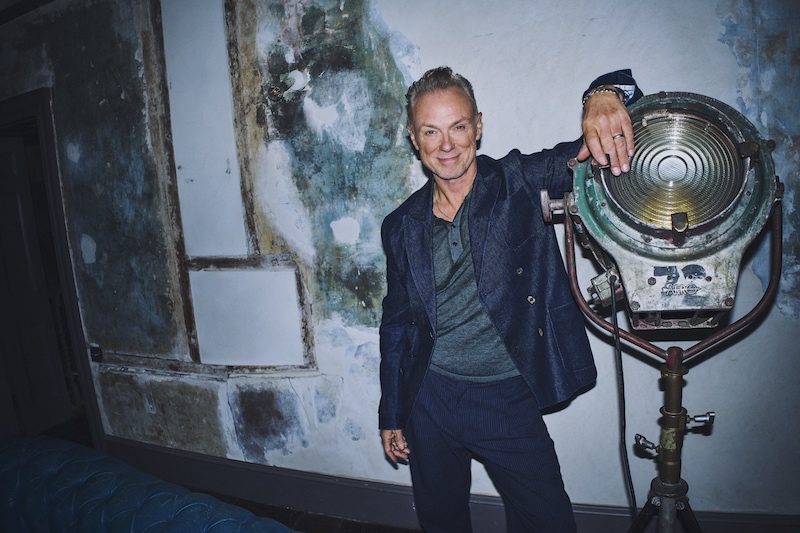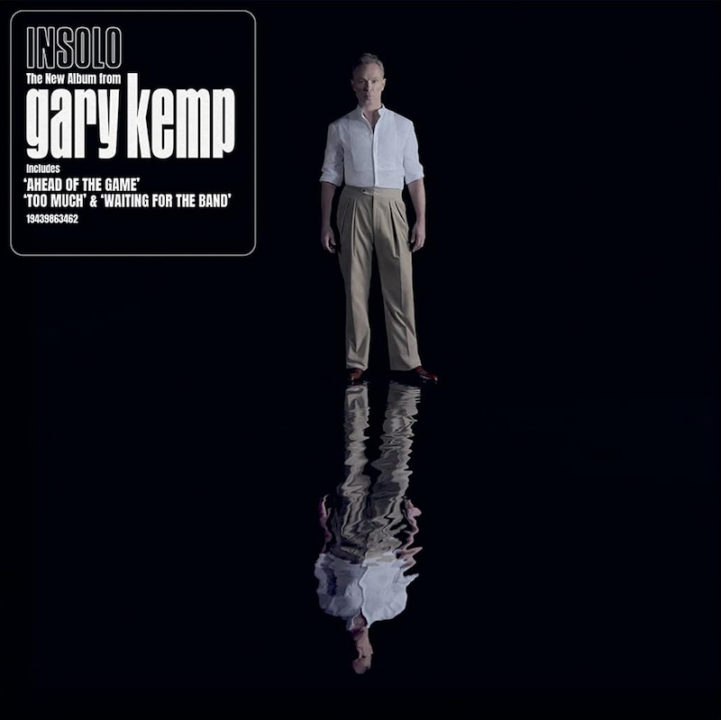
Picture credit: Simon Emmett
Despite a late-career flourish with Saucerful Of Secrets, a smash hit podcast and establishing himself as a solo artist, Gary Kemp wasn’t in a good place when he began his latest album, This Destination. He tells Classic Pop how he arrived at a new destination with help from Richard Hawley – but he also reveals why Spandau Ballet’s unresolved tensions still need addressing.
Shortly after finishing his previous album INSOLO in 2021, Gary Kemp had lunch with Pete Townshend. The pair are friends, but The Who’s guitarist will always be a hero to Kemp. Thinking about how Townshend remains one of his favourite songwriters, Kemp realised: “I couldn’t go to meet Pete without being creative. What Pete’s music means to me, I thought: ‘Fucking hell, I should be writing something!’”
The songwriting fates allowed Kemp to get a seat for the alf-hour tube journey to Townshend’s home. “I wrote the whole lyric for Borrowed Town on my phone,” smiles Kemp. “In my head, I was looking for peace. It’s a song about how London isn’t my London anymore.”
Rather than a reactionary rant about a mythical lost London, Borrowed Town is typical of the reflective mood of Kemp’s new solo LP, This Destination. There’s a sense of acceptance in the song, which fits the thoughtful, reasoned songwriter Classic Pop meets at the central London office of Kemp’s publicist.
London Calling
In a black Adidas tracksuit top and black baseball cap, Kemp looks a decade younger than 65, slim and essentially how you’d imagine the Kemp of the Blitz days would appear now, rather than the gentrified pop star of Spandau Ballet’s commercial peak. But there’s a thread throughout Kemp’s third solo album of examining how his surroundings have changed as a lifelong Londoner.
“London is always in flux,” considers Kemp. “You only get to borrow it for a short period. Spandau created part of London’s social history with the Blitz, so I was privileged to make London culturally my own for a time. But then someone else comes along. Now, it’s the London of influencers and whatever they’re into.”
Kemp believes those changes are simply part of London’s eternal progress, but admits: “I was beginning to question whether London was my place at all anymore.” Did writing Borrowed Town help Kemp come to terms with his life there? “Well, I haven’t moved! The song is an acceptance of who I am, that I’m one of the old people now. In Spandau’s early days, I’d see old people who had fought in the war. I couldn’t understand them, as their lives were so different to mine. I felt like they lived in the past. Really, they must have looked at Spandau and thought: ‘You’re not my London.’ You have to accept that you’ve passed the baton on to younger Londoners – but you’re still part of its fabric.”
Emotional Rescue
Although the music for Borrowed Town came later, its lyrics were the first to be written for This Destination. They set the tone for its mood of Kemp questioning his place in life, both geographically and as a musician. He’d enjoyed making INSOLO but, with OAP status approaching, he didn’t feel settled.
“I started the album not in a good space, emotionally,” he states simply. “Put Your Head Up deals with how I felt, too.” The breakthrough in summarising Kemp’s emotional state arrived from an unlikely source. Richard Hawley has become friendly with Kemp since appearing on Rockonteurs, Gary’s podcast with Guy Pratt. Hawley phoned Kemp one afternoon, the latter admitting he was struggling with writer’s block. Hawley told him: “Go to the piano, put your hands above your keys and close your eyes. Right, I’m going to go and you’re going to write a fucking brilliant song.”
The result was Work. It describes Kemp’s father Frank, a printer, who struggled with his mental health when he was unable to work after a heart attack. Remembering his parents’ struggles put his concerns about writer’s block into perspective, as Kemp reveals: “Dad had a nervous breakdown because he couldn’t put food on the table when he was ill. Mum cried as she couldn’t buy me a new pair of shoes. And here I am, in a posh house with a grand piano, feeling shit about myself. How dare I? I wanted to follow the thread of those feelings.”
Work describes the continuation of the male Kemps being nurtured by their respective wives, as Gary explains: “Mum held dad’s hand when he wasn’t feeling good, and my wife was holding my hand when I wasn’t feeling so good either, trying to work things out. Life was coming full circle.”
Change In Perspective
The self-explanatory Windswept Street (1978) describes Kemp’s excitement walking into Soho from Islington, then still a working-class suburb of London, taking onthe world in Spandau’s earliest incarnation. “At my age, you start looking back on your past to write about, rather than the present,” Kemp reasons. “I’m a 65-year-old bloke, looking back on what I did to what I am now.”
Naturally, it helps for Kemp to open up about his feelings in his songs because now they really are his songs, rather than writing them for the rest of Spandau Ballet to get to grips with. He emphasises that it wasn’t just having Tony Hadley sing his words that made it hard to be fully open in the band’s music.
“My songwriting was more self-conscious back then,” accepts Gary. “I was aware I had to write for other musicians. I had to write for Tony’s voice, include a saxophone solo for Steve, do what was good for the band. I was always thinking about delivering it for them, and what they were going to think about a song. At my age, I just want to write for myself. I enjoy doing what I do now.”
True was famously about Kemp’s crush on Clare Grogan, but it wasn’t the toughest song he had to turn into a band composition. “The hardest song I ever had to let go for Spandau was Through The Barricades,” he discloses. “That was really my song. I got my head around it becoming a song for the band because it was a story about other people.”
Take The Wheel
On the new album, Take The Wheel also explores Kemp’s doubts as he asks for guidance. It’s not a stretch to see it as a plea for help with his music. Yet, over the course of 40 years, Kemp has never been a co-writer. Spandau’s songs were, of course, by Gary, with the rest of the band absent from the writing credits. His three solo albums haven’t seen him team up with other songwriters either.
That’s unlikely to change, as Kemp laughs: “Having someone else in the room when I’m writing is like having someone else in the bathroom. I have tried writing with other people but, for me, the song doesn’t become truthful. You start writing with money in mind, or a hit song. You can’t write as fast as the other person wants you to.”
Instead, ever since Kemp wrote his very first song aged 11, he wants them to answer whatever questions he has in his head: “I’m my own therapist,” as he puts it. Rather than seeking out another co-writer, Take The Wheel is about: “Trying to solve a crime that I felt I’d committed myself. There was a villain in my own head I was trying to overcome. It’s a film noir song, with me as the Philip Marlowe of my own emotions.”
The Great Gig
If Kemp’s anxieties make it seem life has been tough since INSOLO, it should be noted he’s well aware his career has been going just fine lately. As anyone who’s heard Rockonteurs can testify, Kemp remains one of music’s great enthusiasts. It helps that, since Spandau split, Kemp has found other professional passions: alongside Rockonteurs, he tours as singer and guitarist in Saucerful Of Secrets, the band led by Pink Floyd drummer Nick Mason which focuses on the band’s early music.
“I don’t think I’d be doing my solo music if it wasn’t for Saucerful,” reasons Kemp. “Doing that has given me my own validation, as it gave me an audience that’s way outside of the norm I had with Spandau. So has Rockonteurs. Late in life, I have managed to find an audience of people who get me now. I get to play more guitar in Saucerful and, although I share vocals with Guy [Pratt – bassist], I sing, so my confidence as a frontperson is good. At this stage of my life, I’m happy with where my voice sits.”
This Destination also finds room for Kemp to introduce a more theatrical side to his songwriting with the riotous At The Chateau and Dancing In Bed exploring his love of the art world and musical theatre respectively. Having become friends with Graham Gouldman, those songs were inspired by Kemp’s teenage love of 10cc.
The album’s emotional climax is its title track, a joyous celebration of the power of songwriting and how it’s helped Kemp overcome those film noir inner villains. But on an album that’s as complex as This Destination, the emotional journey isn’t quite as neat as Kemp would wish.

Picture credit: Simon Emmett
Unresolved Ending
At the end of our time together, Classic Pop asks if finishing the album has given Kemp contentment with his achievements. He could have given a pat answer, but instead he chooses to reveal what seems to be at the heart of his professional unease. He begins: “What makes me unhappy is the unresolved sides of Spandau Ballet, how we’ve tried to get back together over the years and tripped up.”
CP tells Kemp that, as a fan, it’s sad the band’s final show with Hadley in 2015 was a corporate motor racing event in Hong Kong. That doesn’t feel like a fitting farewell. Kemp’s smile becomes a Charlie Brown wavy line when reminded of that concert. “No, it isn’t the right farewell,” he acknowledges. “It annoys me that it led to us doing some shows with another singer.”
In 2018, Spandau played a solitary tour with West End singer Ross William Wild. “The minute we got on stage, I knew it was wrong,” he says. “I gritted my teeth, as my brother and I looked at each other and said: ‘We’re not doing this again.’”
Kemp explains the initial plan had been for Seal to replace Hadley as Spandau’s singer, saying: “Seal agreed to do a tour with us. Seal was flying in, we were all in the rehearsal room waiting – and he pulled it. We were all high and dry, so we said: ‘Why don’t we go and get someone else?’ We went from doing a big tour with a big singer to having to find someone else. It never felt right, and I haven’t seen Tony since [Hong Kong].”
Life’s A Journey
The obvious question, then: Could things be resolved? There’s a wary look, a plea for Kemp’s response “Not to be the main headline and the main story,” but an honest assessment, delivered without hesitation: “I’m happy in life. But there are unresolved issues with Spandau, that we didn’t say goodbye properly or leave the door open.
“It’s hard when we’re all such different people, in different headspaces. But if Tony wanted to do it tomorrow, I’d love to do some shows. It’d be nice to finish Spandau on a good note. I’m definitely not angry with Tony in any way, and I know there are some good offers for shows.”
Whatever happens with the rest of the band, there are plans for a deluxe boxset of Spandau’s first two albums, Journeys To Glory and Diamond, to coincide with a seven-month exhibition based around the Blitz Club at The Design Museum in London later this year.
More to the point as a musician, it seems like Gary Kemp will always have a film noir playing in his head to write songs about. A broad, youthful smile materialises as he summarises the journey to get to This Destination. “The album story looks like it starts at Borrowed Town and arrives at the title track, which is totally positive and up. I can see how it looks like this album is my cure. But life isn’t that binary. And recently, I’ve been back at my piano – worrying again.”
This Destination is available on Red Gold Vinyl, Standard CD, Deluxe CD, Digital and Atmos. It is out on 31 January 2025 via East West Records. Order here
Subscribe to Classic Pop magazine here
Classic Pop may earn commission from the links on this page, but we only feature products we think you will enjoy.




